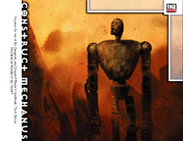
|
About OgreCave and its staff
|

|
by Frank Gagnon
Gears with animus? Mechanical limbs with feelings? Construct Mechanus is a recent d20 supplement with rules to generate “self-willed” constructs beyond the usual animated objects and golems. It is also slated as first in a series dedicated to magical robotic characters and constructs, each future installment adding to the list of possibilities and expanding on this supplement’s foundation. The sentient robots within come off the assembly line with optional body parts and abilities chosen to meet the point total assigned to each “robot,” providing ample variety. Furthermore, the constructs each have their favored class for PC use or “monster” advancement. Constructs may benefit from the special Mechanus feats, including the Antimagic Field (as an initial feat?) to Enhanced Targeting and Retractable Shield. Some of the proposed feats would better fit the whole as point-based construction elements. The supplement concludes with optional rules on firearms for those wishing to fit fantasy robots with such devices. The author’s choice to forego any construction mechanics may leave some readers high and dry. This deficiency gets justified by the statement “That knowledge requires a wizard of such great power to understand it that nothing could be gained from including it here.” Many readers may find this a disappointing bypass to avoid setting down rules and writing up precise creation spells in detail. Providing game mechanics such as spells, rituals and the usual “magic item creation” would have made Mechanus creation more palatable and more readily usable in game context. A less experienced DM wishing to include these robots as foes may be baffled by the “great power” statement and might make them the exclusive purview of liches. We can hope that this issue might get resolved in the reworked Construct Mechanus (see note below). However, a good DM can readily make up for this state of affairs. All of the material in Construct Mechanus is OGL and usable both personally and commercially, a laudable approach.
Presentation Christopher Shy’s artwork lends a pleasantly dark and eerie feeling to the whole, somewhat reminescent of Warhammer products. For the “ink cartridge conscious,” the PDF arrives in dual versions, one for screen and the other as a printer-friendly version. For those familiar with Planescape: Torment’s Modron Cube, a resetting mechanical dungeon maze found in the PC game, the material presented in this small sourcebook would go a long way in recreating the software game’s artifact.
Conclusions Is Construct Mechanus a reasonable value? This opens the door to the eternal and unfair comparison of print product pricing and PDF offerings. Yes, PDFs are more expensive per page when compared to most print products, and Construct Mechanus rates above the average page cost. But PDF supplements provide an offering of diversity that would otherwise soon disappear. At $4, we must already compare with others such as Malhavoc’s publications where page count is not only higher, word count per page also exceeds that of Construct Mechanus (as per a cursory sampling done by this reviewer). As a counterpoint, the art of Construct Mechanus is full color. Though a professional quality product, not everyone will be satisfied. Note: Philip J. Reed, the author, is working on the expanded release of Construct Mechanus and states the prospective length at twice the size of the current product. Owners of the present “earlier” version will get an update. I look forward to the re-issuing of this supplement. See details at www.philipjreed.com or RPGNow.com.
|
||
 Construct Mechanus
Construct Mechanus